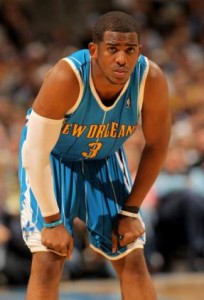On a sports day that had been dominated by news of Albert Pujols leaving the St. Louis Cardinals to head to Anaheim and the Angels, one could have reasonably expected a good night’s rest and relaxation. Instead, sports writers had to put on the coffee and gear up for another huge story, because the New Orleans Hornets stunned the basketball world and dealt star point guard Chris Paul to the Los Angeles Lakers.
The deal would have involved the Houston Rockets as well, and would have sent Luis Scola, Kevin Martin, Goran Dragic, Houston’s 2012 1st Round pick (acquired from the Knicks) and Lamar Odom to the Hornets. The Rockets would have acquired Pau Gasol as part of the trade, but the Lakers obviously would have made out like bandits by both keeping Andrew Bynum and acquiring Paul.
As you surely noticed, there are a lot of “would have’s” in that paragraph. And that’s because the NBA stepped in and nullified the trade.
NBA Commissioner David Stern, responding to pressure from basketball executives from around the league, nullified the trade on what can only be described as shaky grounds. According to a report by Adrian Wojnarowski of Yahoo! Sports:
“Some owners pushed Stern to nullify the trade and that the Hornets be made to keep Paul on the roster for the foreseeable future, sources said. A chorus of owners were irate with the belief that the five-month lockout had happened largely to stop big-market teams from leveraging small-market teams for star players pending free agency.”
The Lakers have been involved with this kind of uprising before. Back in 2008, the Lakers acquired the aforementioned Gasol from the Memphis Grizzlies for a package that looks as bad now as it did then. The Lakers got Gasol and Memphis’ 2010 2nd round draft pick for Kwame Brown (6.8 PPG, 5.6 RPG in his career), Javaris Crittenton (5.3 PPG, 2.4 RPG, and currently charged with murder), Aaron McKie (a 36 year old the Lakers had signed that day, and didn’t play a minute for Memphis), and the draft rights to Marc Gasol (okay, he worked out). The Grizzlies also got the Lakers’ first round picks in 2008 and 2010.
That trade wasn’t nullified by the NBA despite its sheer idiocy, but this one inexplicably did. Yes, the NBA should have some control in situations where teams are trying to circumvent competitive balance and common sense, but in this situation, Stern and the league have massively overstepped their bounds. The Hornets know that Paul doesn’t want to be in New Orleans after this season, and so they are well within their rights to trade him to improve their standing in the future.
They do not want to end up like the Cleveland Cavaliers when LeBron James left, and this trade would have helped them make some progress towards that.
Odom is a very serviceable player who can add some size and some offensive punch to the Hornet lineup, and Martin, Dragic, and Scola are all good players as well. None of these guys are huge superstars, but they still can provide a solid base for a team in rebuilding mode to construct a quality squad around, and the Hornets seem to have gotten some good value for the deal. Unfortunately for them, Stern was put in a bad position by the executives who balked at the deal, and he made the wrong decision and sided with them.
Further complicating matters is that the Hornets are currently owned by the league, as the NBA is trying to find them a new owner and rescue them from bankruptcy. Obviously, it would be in the league’s best interest for the Hornets to retain Paul, as he is a marketable player who can drive ticket sales and TV ratings, but even still, to interfere with basketball operations to such an egregious degree is unacceptable, especially when a trade like the Gasol one was allowed to pass, despite the whole “victimizing small market team” argument that the NBA is using this time.
In addition, there is the matter of Paul now being forced to return to the Hornets. He is a very classy player, and he won’t let his dissatisfaction with the situation affect his play on the court if he actually plays for New Orleans this season. Despite that, however, one can’t help but feel sorry for a player stuck in a situation that isn’t his own fault, playing for a team that is going nowhere either financially or competitively.
The NBA needs to mind its P’s and Q’s from now on when it comes to this type of stuff. Affecting a team’s ability to conduct its operations, especially in what seems to be a fair trade like this one, is a dangerous precedent for a league coming off a work stoppage that has dropped its standing in the minds of sports fans.

